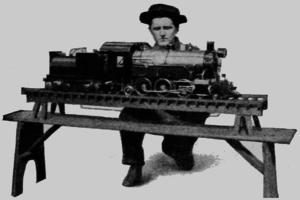Arthur Johnson: Difference between revisions
Jump to navigation
Jump to search
(Created page with "Category:People From https://archive.org/stream/popularsciencemo88newyuoft#page/24/mode/2up Popular Science Monthly, Volume 88, January-June 1916, page 25]: File:PSM V8...") |
No edit summary |
||
| Line 1: | Line 1: | ||
[[Category:People]] | [[Category:People]] | ||
From https://archive.org/stream/popularsciencemo88newyuoft#page/24/mode/2up Popular Science Monthly, Volume 88, January-June 1916, page 25]: | From [https://archive.org/stream/popularsciencemo88newyuoft#page/24/mode/2up Popular Science Monthly, Volume 88, January-June 1916, page 25]: | ||
[[File:PSM V88 D053 Working model steam locomotive.png|thumb|right|300px|Arthur Johnson poses with his live steam locomotive, 1916]] | [[File:PSM V88 D053 Working model steam locomotive.png|thumb|right|300px|Arthur Johnson poses with his live steam locomotive, 1916]] | ||
Latest revision as of 13:51, 26 August 2015
From Popular Science Monthly, Volume 88, January-June 1916, page 25:
- A Boy's Wonderful Working Locomotive Model
- A miniature railway locomotive, complete in every detail, which has attracted the attention of the railorad officials of several Pacific Coast lines, is the handiwork of Arthur Johnson, of Portland, Oregon.
- This tin locomotive, only forty-five inches in length, was built to test a new invention of his on a firebox. It is operated by steam, generated by oil fuel, and is equipped with air brakes, an interior throttle and reverse levers and gears.
- The engineering department of the Southern Pacific Company borrowed the model and figured out its weight, power, and all other statistics in the same manner that they would figure on a full-size locomotive. To their surprise they found that the tiny engine developed one-quarter horsepower, and on a level track had a haul capacity of one and a quarter tons.
